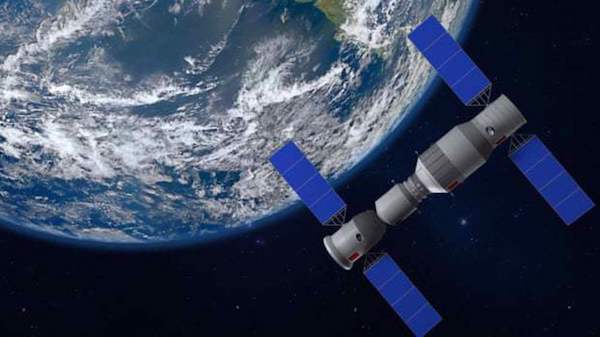image1
The file photo shows a model of the Chinese space station Tiangong orbiting Earth.
China says the United States is ignoring its obligations under outer space treaties and endangering the safety of astronauts, following two "close encounters" between a Chinese space station and satellites operated by the private American company SpaceX this year.
At a regular press conference in Beijing on Tuesday, Chinese Foreign Ministry spokesman Zhao Lijian said that Chinaís new space station, Tiangong, had to maneuver to avoid colliding with a Starlink satellite in July and October, while condemning the United Statesí "irresponsible" and "unsafe" conduct in space.
"The US... ignores its obligations under international treaties, posing a serious threat to the lives and safety of astronauts," Zhao said, urging Washington to "act in a responsible manner" and take measures to prevent such close encounters from happening again.
He said China had complained to the United Nations Office for Outer Space Affairs earlier this month about the two encounters.
According to a note submitted by Beijing to the United Nations space agency, the incidents "constituted dangers to the life or health of astronauts aboard the China Space Station."
Under the principles of Outer Space Treaty, which forms the basis of international space law, members should bear responsibility for both their governmental and non-governmental activities in outer space, it added.
Starlink, a division of SpaceX, operates a constellation of close to 2,000 satellites that aims to provide internet access to most parts of Earth. SpaceX, which is a private American company independent of the US military and NASA, has not commented on the incidents.
Meanwhile, Jonathan McDowell, an astronomer at the Harvard-Smithsonian Center for Astrophysics, said evasive maneuvers to reduce the risk of collisions in space are becoming more frequent as more objects enter Earthís orbit and with higher frequency.
"Weíve really noticed the increase in the number of close passes since Starlink started getting deployed," he told AFP, warning that any collision would likely "completely demolish" the Chinese space station and kill everyone on board.
Beijingís complaint about Starlink prompted criticism on Chinese social media of SpaceXís billionaire founder Elon Musk, who is otherwise widely admired in China for his business accomplishments. Muskís electric car maker Tesla sells tens of thousands of vehicles in China each month.
"Prepare to boycott Tesla," a user commented on the popular Chinese social media platform Weibo.
Chinaís space program has already seen the nation land a rover on Mars and sent probes to the moon.
The core module of Chinaís Tiangong, or "Heavenly Palace," entered orbit earlier this year and is expected to become fully operational next year. The completed station will be similar to the Soviet Mir station that orbited Earth from the 1980s until 2001. It is expected to be a competitor to the International Space Station (ISS) and may become the sole space station to remain in orbit once the ISS retires.
The ISS is due for retirement after 2024, although NASA has said it could potentially remain functional beyond 2028.











